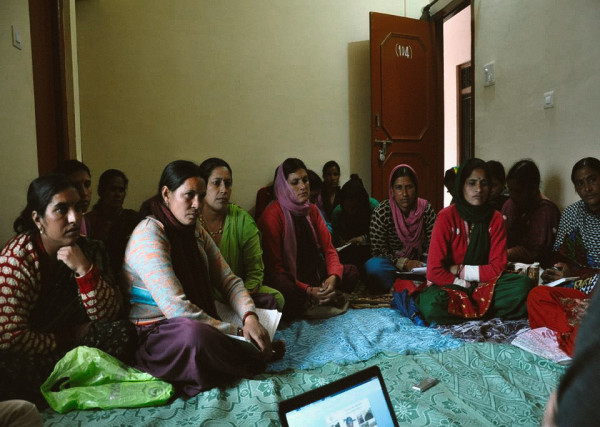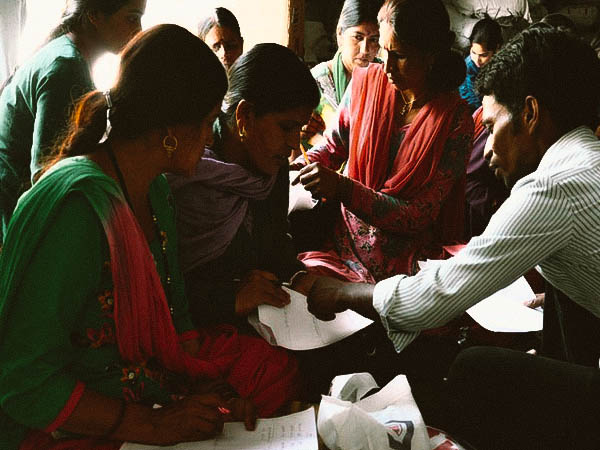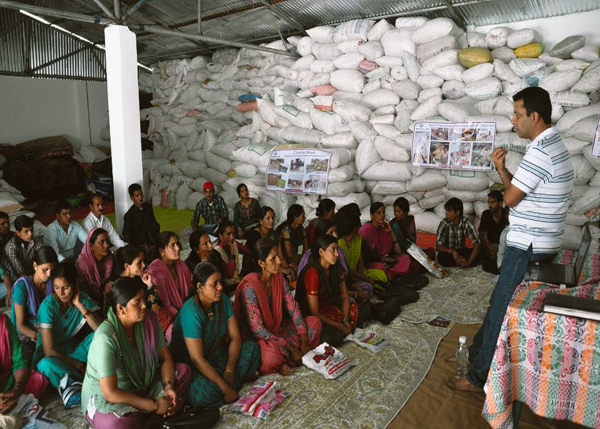Goonj Launches A Million Voices: A Global Campaign to Shun the Shame and Silence Around Female Health

World wide, whether it’s the developed or the developing world, menses or menarche, has been a word shrouded in a culture of shame and silence for countless young girls and women. This lingering silence combined with inadequate information and lack of access to sanitary pads or even clean cloth, has resulted in some shocking practices and cruel realities for millions. Sand, ash, rags, jute gunny bags are used during menses and many a times nothing at all is used, since many struggle to get even basic clothes to wear. Extreme poverty in some remote areas even forces women to share the same piece of cloth. Consider these shocking statistics.
1. Around 70% of women in India say their family cannot afford to buy sanitary pads.
2. A study from UNICEF revealed that 1 out of 3 girls in South Asia knew nothing about menstruation prior to getting it while 48% of girls in Iran and 10% of girls in India believe that menstruation is a disease.
3. At least one in five girls drop out of school when periods begin, according to research by AC Nielsen and Plan India. It is very common (41% and 28%, respectively in Nepal and India, Water Aid survey 2009) that girl students go either absent from school or perform poorly due to lack of facilities.
Though this is a complex issue with different challenges like access, affordability and awareness about menstrual hygiene, the prime link is the silence… Many of us living in the cities or even in smaller tier 2 or 3 cities may find the gruesome aspects (mentioned above) a bit hard to imagine but there are some hidden aspects in cities as well which most of us have come across but have never really thought about. Consider these:
Why the sanitary napkins are always sold in black plastic bags?
Very rarely will you find a man buying napkins for his sister, mother or wife.
Try talking to your father, brother, male friend about the issue and notice the visible discomfort.
Ever wondered what your maid who looks after your children, your house or your cooking etc does in those 5-6 days of menses? Shouldn’t you find out…
The silence is felt the worst by countless young girls around the world, who are not taught what menstruation is until their first period. Many girls think they are dying when this happens. Male family members have no knowledge of menstruation and girls do not feel comfortable even talking to their mothers about the subject. In turn, this ‘culture of silence’ creates a culture of shame and embarrassment around menstruation in families and communities. Though many organizations are working on distributing sanitary napkins to adolescent girls and women in the most underprivileged communities, the issue is larger and more deeply ingrained in our collective cultural psyche.

To mainstream this issue and to shun the taboo around this natural biological process Goonj, an India based award winning non- profit, has launched NJPC- A Million Voices campaign bringing together a million voices shunning the taboo on menses. (NJPC stands for Not just a piece of cloth; the most basic need of a women to deal with her menses). The main element of this global online campaign www.njpc.goonj.org is a questionnaire aimed at getting one million men and women from all walks of life to share their thoughts, opinions and practices around menses. The website www.njpc.goonj.org also shares a lot of global disturbing facts, practices, case studies and research on the issue. The million voices collected through this campaign will be a part of Goonj’s sustained efforts to bring about a mindset change in the civic society on this issue.
Anshu Gupta, Founder Director Goonj, the brain behind this campaign says, “Goonj has been working on this issue for almost a decade now. We strongly believe that till a dialogue is not opened up in the masses, making it a normal thing to talk about…all the taboos, embarrassment and health risks associated with menses will continue. We have to understand that this is not just a women’s issue, it is a bigger, human issue”.
In the last few years, Goonj has reached over 2.5 million cloth sanitary pads called MY Pad in remote parts of the country including a major focus during disasters right from Bihar floods to Uttarakhand floods. Goonj has thus turned half a million meter of last shreds of thrown away cloth (headed for landfills otherwise) into a vital product, to address this ignored need.
NJPC- A Million Voices campaign and website is initiated by Goonj and is an extension of its ongoing work across India. Our aim is to spread awareness about this basic need across the globe and get more people to talk about it, to break the taboo and shame around this natural process.
About the initiator: GOONJ (means an echo) www.goonj.org a multi award winning social enterprise, started the NJPC (Not Just a Piece of Cloth) initiative in 2005, around a decade ago. NJPC is focused on opening up the most taboo and ignored subject of menstrual hygiene; a female health hazard by involving the masses in generating an affordable cloth napkin. The NJPC programm is a nationwide intervention, which starts with providing a physical product but stresses more on changing practices, behavior change, education and replication in the long term. MY Pad, Goonj’s clean cloth sanitary pad is developed out of old cloth collected from urban masses. It is made with highly indigenous processes while also educating the user women to make it on their own.
Learn.Connect.Act.
Learn more about Goonj
Connect via Facebook and Twitter
Act by lending your voice to the Goonj One Million Voices Campaign.
Here are the six things anyone can do to be a part of this campaign:
1. Fill up the NJPC- A Million Voices form
2. Organize a collection drive for cotton cloth
3. Contribute for the ‘60 dignified days’ campaign
4. Hold a Chuppi Toro Baithak/ Hold a Break the silence talks
5. Set up a Million Voices cart to spread the word in your area
6. Support the Million Voices campaign financially
For more details you can write to Goonj at njpc@goonj.org


